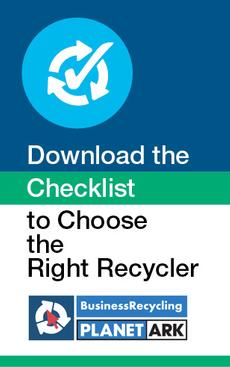What do you need to think about when choosing a new recycler? Check out these guides that will keep you on the right side of the law.
The Choosing the Right Recycler Checklist and Factsheet outlines the key questions you should ask a potential recycler to help you ensure they are doing the right thing environmentally and legally. It is now available as a downloadable pdf, or you can bookmark this page for reference.
We also link to guides to help your business secure the most appropriate waste and recycling contract for your requirements.
Your Legal Obligations
Now that you've decided to recycle the waste generated by your workplace, it’s important to make sure you choose the ‘right’ recycler. Most companies will transport and/or process the materials they collect in the correct manner, however, like most industries there may be some businesses that don’t do the right thing. This could include illegally exporting waste, dumping materials or operating a facility that doesn’t meet regulations.
This is important because under the environmental legislation in your State or Territory, you may have a legal obligation to ensure that the transporter and the facility receiving your waste have legal authority to undertake the relevant activity. (Please note the following is for information only and does not constitute legal advice.)
The environmental legislation in your State or Territory may include rules about how waste should be safely transported and managed to protect the land, air and waterways. Waste and recycling facilities and transporters are required to abide by the environmental legislation in the States and Territories where they operate, as well as any specific restrictions that have been included within their licence (if they need one). Generally speaking a recycler will require development consent, usually from the local council, to operate a facility.
The right recycler therefore is one who:
- Has legal authority by holding a licence and/or by having the development consent to undertake the activity; and
- Is conveniently located and offers value for money.
Legal Obligations
For further information about your legal obligations:
- In NSW see Section 143 of the Protection of the Environment Operations Act 1997.
- To find out more about the environmental legislation in your location go to business.gov.au and scroll down to your state.
Choosing the Right Recycler
Choosing the right recycler involves a little research to find the potential service provider and then asking them a few questions to ensure that they are acting legally and responsibly.
Below are a series of questions you could ask a recycler along with some explanations of why these questions are important.
- Do you handle the particular material as indicated in BusinessRecycling.com.au and what, if any, will the cost be?
Recyclers list and manage their own information on the website. In some cases what a recycler can or will collect changes so it’s good to check that they still accept the materials you are looking to recycle – and find out how much it will cost.
- Do you have a licence to collect, transport and/or recycle/dispose of the particular item/material and/or have development consent for the related activity on site?
Usually the types of materials that require a license are hazardous or potentially hazardous, or they are collected and recycled in very large quantities by the operator. For example, under international agreements it is illegal for Australian-based companies to send electronic or other hazardous waste overseas without a licence.
When licences are required, they are issued by the State and Territory governments or, in the case of materials going overseas, the Federal Government. A transporter or recycler should be able to tell you their licence details or at least their licence number.
To find out whether the recycler needs a licence for the material you are looking to dispose of contact your State or Territory environment agency.
- Are you currently under investigation or have you ever been fined for breaches of any environmental laws?
Breaches of environmental laws can relate to things like illegally transporting or dumping waste, illegally using an area of land as a waste or recycling facility, causing pollution (e.g. land, water, air or noise), not cooperating with authorities, not having local government consent and providing false or misleading information about waste.
Although a company may have been fined for breaching environmental laws in the past, they may have taken significant corrective actions to fix the problem and/or introduced systems to prevent future incidents. If your recycler has been fined before, ask them what it was for and what they are doing to prevent it from happening again.
Some States and Territories keep a public register of licensed facilities and all court proceedings relating to the environment.
- Do you have third party accreditation or are you a member of an industry body?
As a rule of thumb having third party accreditation is a great way to help ensure that a recycler acts responsibly. It means that an independent body has reviewed the policies and practices of the recycler for consistency.
For example, Close the Loop, the recycling partner for the Cartridges 4 Planet Ark program, is audited every year to assess whether it’s meeting its zero waste to landfill guarantee.
There’s a range of well-known accreditation bodies including Good Environmental Choice Australia who have released the Waste Collection Services Standard to recognise best practice within the waste industry (currently available in NSW only). The International Organisation for Standardisation (ISO) also provides accreditation relating to the environment through the ISO 14000 series. One standard (ISO 14001) outlines the requirements for an accredited Environmental Management System (EMS). If a company has an ISO 14001 EMS, it means it has a system in place to identify and control their environmental impact, has committed to continually improve its environmental performance, and has a systematic approach to setting environmental objectives and targets.
Recyclers can also belong to industry bodies or industry associations. These organisations are made up of many of the companies in a sector or in a state, and they work to represent, educate and promote their industry. There are equivalents to Waste Contractors and Recyclers Associations (WCRA) in most States including NSW and QLD. Recyclers can be reputable without being members of an industry group but these associations have codes of conduct that govern how their members act.
Additionally, there are often material or product specific industry associations. One example is the Australian Battery Recycling Initiative (ABRI), which is made up of manufacturers, recyclers, retailers and government agencies and it aims to increase the recycling of all types of batteries. All members sign a Code of Conduct as a prerequisite to membership.
Generally speaking (but not in every case), reputable recyclers will be members of these or other similar associations and they will be open about their membership.
- What happens to the items/materials you recycle?
Reputable recyclers are more likely to provide detailed information about what happens to the materials they recycle. For single stream, separated materials like cardboard or aluminium cans the recycling process is pretty simple and is likely to be done in one location. But for items like electronic equipment there will be multiple processes including dismantling, separating, transporting, recycling and in some cases safe disposal. A reputable recycler will provide information about:
- the recycling processes used
- the types of materials recovered
- which companies, if any, materials are sent to
- where the recycling takes place ie. either locally or overseas, and
- what the final recovered products are used for.
If materials are sent overseas, find out if the country complies with international agreements like the Basel Convention, which aims to reduce the movements of hazardous waste between nations.
The more open and detailed a company’s disclosure is, the more believable it is.
- Can I inspect your recycling facilities?
Visiting a recycler’s facilities is a great way to see for yourself how they operate. There may be areas of the facility that are off limits for safety or intellectual property reasons but in most cases a responsible operator will welcome a visit – especially if a potential contact is for a significant quantity of materials.
If a recycler’s facilities are overseas, ask what evidence they can provide that it operates responsibly and in a lawful manner. Are there audit reports you can view?
- Who pays for the recycling?
There is actually a cost to recycling most materials and items. If a service is free, it’s worthwhile asking how these costs are being covered. In the case of programs like Cartridges 4 Planet Ark and MobileMuster, a group of manufacturers, and carriers cover the cost of recycling as an extension of their corporate social responsibility programs. For some items, recycling programs are funded by a levy on those products like Paintback for paint and Tyre Stewardship Australia for tyres.
For large or complicated items like mattresses and computers, it’s unlikely that the recycler will get enough value from the component materials to cover the cost of recycling them. Asking who pays for the recycling will help you assess whether other partners are involved in a program and whether the recycler is being responsible with the waste.
- Will you provide regular reports on your recycling performance?
Reputable recyclers should be able to provide you with regular recycling performance reports to help you monitor costs and environmental performance and identify areas for improvement at your sites.
Ideally, the recycler will provide you with reports for each site, including the location and date of collection, type/s of materials collected, quantity and weight / volume of materials collected, recycling and resource recovery rate, bin rejection information if applicable, and costs. Some recyclers may also be able to report back to you on greenhouse gas emissions avoided or natural resources saved from recycling your waste.
If they cannot provide site-specific reports, they should be able to provide annual reports on their overall performance, including their recycling and resource recovery rates, waste volume, waste types, frequency of services, and benefits to the environment from their recycling activities, such as greenhouse gas emissions avoided and natural resources saved. Their reports should also include information about their services, facilities and practices, and ideally, their own environmental and sustainability performance.
The information provided above is available in the downloadable Choosing the Right Recycler Checklist and Factsheet (PDF).
Waste and Recycling Contracts
These guides may assist your business to secure the most appropriate waste and recycling contract for your requirements.
Using the BusinessRecycling Website
The BusinessRecycling.com.au website and Hotline (1300 763 768) are open for all recyclers to list their services. Planet Ark reviews all new listings for consistency of language and to ensure that the recycler isn’t overtly advertising or recruiting for business on the site. Planet Ark does not endorse any of the services listed on the site and although we investigate and act on any complaints of inaccurate information, we don’t have the capacity to verify all the listed information. This means it’s worthwhile for you to do a little investigation when looking for and making contact with a recycler.
All recyclers on the site have an option to list any third party accreditation or industry body membership they have. Look for information entered in the Accreditation and Membership space in the business listing.


